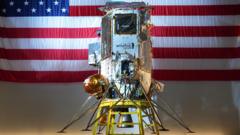The move highlights the growing impact of AI on employment and the banking sector's evolution amid concerns of inequality and job displacement.
**DBS Bank Plans Significant Job Cuts as AI Integration Accelerates**

**DBS Bank Plans Significant Job Cuts as AI Integration Accelerates**
DBS Bank in Singapore announces a reduction of 4,000 roles attributed to advances in artificial intelligence, while simultaneously preparing to create 1,000 new AI-related jobs.
In a transformative decision, Singapore's largest bank, DBS, has indicated plans to eliminate approximately 4,000 positions over the next three years, as the integration of artificial intelligence (AI) increases. According to a DBS spokesperson, these job reductions will mainly occur through natural attrition, with temporary and contract roles declining as they naturally phase out over time.
However, the bank reassured that permanent employees would not suffer from these cuts and announced an interesting paradox: the creation of around 1,000 new jobs focused on AI. This places DBS at the forefront of transparency regarding AI's impact on their workforce within the banking sector, making it one of the first major financial institutions to publicly disclose such measures.
Current CEO Piyush Gupta, who will depart at the end of March, disclosed that the bank has been adopting AI technology for over a decade. As of now, DBS has rolled out over 800 AI models handling approximately 350 different use cases, predicting a financial benefit exceeding S$1 billion (around $745 million) by 2025.
The larger implications of AI technology are being scrutinized globally. The International Monetary Fund (IMF) warned that by 2024, AI may influence nearly 40% of jobs worldwide, potentially exacerbating economic inequality. Kristalina Georgieva, the IMF managing director, expressed concern that in many scenarios, AI could widen the disparity between different socio-economic groups.
In defense of the technological advances, Bank of England governor Andrew Bailey noted that AI is not expected to lead to mass job losses but rather a shift in the workforce environment, where human employees must adapt and learn to coordinate with emerging technologies. He acknowledged that despite the risks, the potential benefits of AI announce a pivotal change in how industries, including banking, operate.
As the landscape of work continues to evolve with the rise of AI, DBS's announcement serves as a significant case study in understanding the delicate balance of innovation and employment in the modern economy.
However, the bank reassured that permanent employees would not suffer from these cuts and announced an interesting paradox: the creation of around 1,000 new jobs focused on AI. This places DBS at the forefront of transparency regarding AI's impact on their workforce within the banking sector, making it one of the first major financial institutions to publicly disclose such measures.
Current CEO Piyush Gupta, who will depart at the end of March, disclosed that the bank has been adopting AI technology for over a decade. As of now, DBS has rolled out over 800 AI models handling approximately 350 different use cases, predicting a financial benefit exceeding S$1 billion (around $745 million) by 2025.
The larger implications of AI technology are being scrutinized globally. The International Monetary Fund (IMF) warned that by 2024, AI may influence nearly 40% of jobs worldwide, potentially exacerbating economic inequality. Kristalina Georgieva, the IMF managing director, expressed concern that in many scenarios, AI could widen the disparity between different socio-economic groups.
In defense of the technological advances, Bank of England governor Andrew Bailey noted that AI is not expected to lead to mass job losses but rather a shift in the workforce environment, where human employees must adapt and learn to coordinate with emerging technologies. He acknowledged that despite the risks, the potential benefits of AI announce a pivotal change in how industries, including banking, operate.
As the landscape of work continues to evolve with the rise of AI, DBS's announcement serves as a significant case study in understanding the delicate balance of innovation and employment in the modern economy.




















